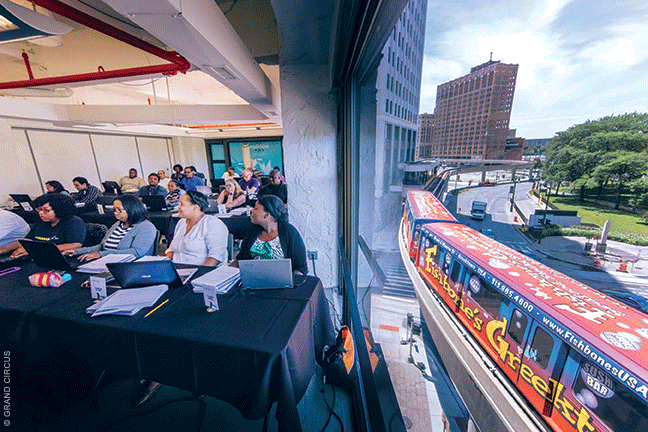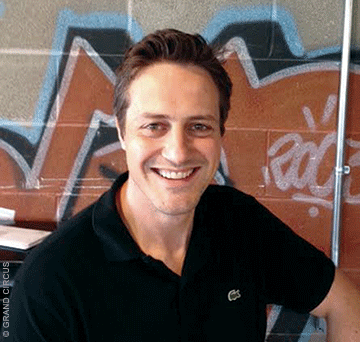
Class of ’01 | By the time Damien Rocchi WG’01 returned to Detroit in late 2009, the Motor City was on the brink of financial ruin. But the Australian native and his wife Jennifer, who grew up in the Detroit suburbs, saw considerable potential there despite the city’s long decline. They invested in real estate, and Rocchi starting doing consulting work. “We were drawn to the idea of coming back here and being part of the upswing,” Rocchi says.
As the city began to negotiate the terms of what would become the largest municipal bankruptcy in US history, Rocchi co-founded Grand Circus, a training center and event space designed to support Detroit’s reinvention as a tech hub. The two-year-old company, which has a staff of 12, specializes in six- to eight-week “boot camps” to train workers in JavaScript, iOS, website development, and other programming skills sought by employers.
“We take people with very limited skills, or people that want to change careers, or people who have a set of skills that are out of date,” Rocchi says.

Grand Circus’s approach has won the attention of some high-profile partners. Google has named the company as one of nine hubs around the country for entrepreneurs, giving it access to funding, services, technology, and mentors from the online giant. Last fall the White House invited Rocchi to take part in a special task force that resulted in TechHire, a new federal initiative that will make $100 million in funding available for training to 20 communities, including Detroit. This outside interest, says Rocchi, is “a tremendous endorsement in the city and what we’re doing in tech.”
For Rocchi, the opportunity to invest in Detroit is about more than just business. His longstanding ties to the area began when he visited the city in the mid-1990s on a three-month consulting stint for National Australia Bank. Once he met Jennifer, he had a more compelling reason to stay, and the two lived there together for several years before relocating to Philadelphia so he could attend Wharton. (They now have two small children.)
In those days, Detroit was in the midst of another comeback, with boosters touting the development of several new casinos and the opening of Compuware’s headquarters downtown. But Rocchi, who returned to Australia for nearly a decade before his latest time in Detroit, says the earlier era doesn’t compare with today’s version. These days entrepreneurs and artists are flocking to Detroit to take advantage of rock-bottom real-estate prices and to be part of a downtown rebirth. (For more on that, see “Alumni Profiles,” Nov|Dec 2012.)
At the same time, major challenges remain. Detroit’s population has dropped by about a third since the 1990s, and is now under 700,000; though its unemployment rate has also dropped in recent years, it’s still the highest of any large city in the country. Unless Detroit can follow through on plans to raze or renovate some 80,000 buildings in its blighted neighborhoods, its story could remain “a tale of two cities,” says Rocchi.
Grand Circus is part of the Madison Block, a group of five downtown buildings being marketed as a new startup neighborhood; they currently house some 70 companies, including Detroit Venture Partners, which helped incubate Grand Circus. The Broderick Building, where Grand Circus operates, had been a dilapidated shell for 30 years.
“We feel the optimism downtown,” Rocchi says. “Because we’re coming from such a low place, we hear about every new restaurant and business that opens. The whole city is very attuned to what’s happening, and it’s exciting.”
Over the past year, Grand Circus has trained about 120 people, placing 70 percent of participants in jobs. (That number has since risen to 92 percent.) During each boot camp, Grand Circus students are introduced to local companies seeking tech-savvy workers, such as Quicken Loans, OnStar Corporation, and Meridian Health Plan. The latter, a Detroit-based company owned and run by physicians, originally was looking to hire two programmers but ended up recruiting four of Grand Circus’s trainees.
“Grand Circus offers a holistic curriculum for people getting into technology,” says Dana Green, Meridian’s director of electronic data interchange. “They are very well-rounded and mature. Their soft skills and judgment and experience have turned out to be very useful.”
Beyond establishing its downtown footprint, Grand Circus has reached out to the community through such efforts as a pilot project to teach coding to students at Cornerstone Health and Technology High School.
For Rocchi, the culture at Wharton helped lay the groundwork to work in a multicultural environment like Detroit.
“Diversity was a fairly new idea for business schools back in the ’90s,” he says. “Wharton was really diverse, in terms of international and minority diversity. Being an international myself, I liked that it had a pretty eclectic mix of backgrounds. I was expecting the opposite—a bunch of white guys who came from investment banks.”
“Damien is an example of how you don’t have to be born here to have a real connection to a place,” says Garlin Gilchrist, Detroit’s deputy technology director for civic engagement. “He’s been willing to apply the fullness of his experience to address needs in Detroit. We have a lot of people who are very smart, interested, and eager to gain these types of skills. We need as many outlets as possible like Grand Circus to provide these opportunities.”
—Robert DiGiacomo

